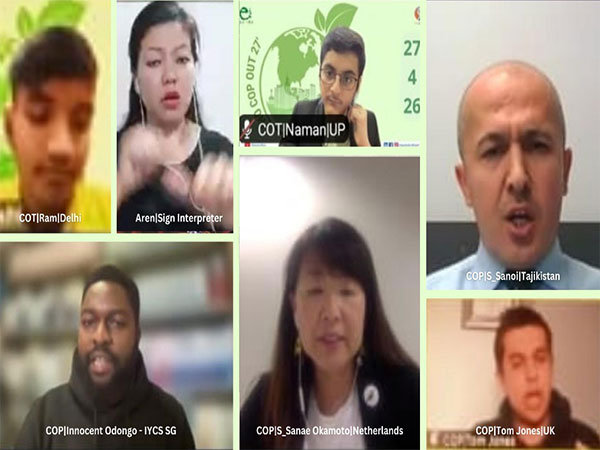COP 27: Over 900 children formulate draft seeking ecological rights
In a bid to have their concerns heard by global leaders, the young ones have put to the fore a list of demands seeking a strong UN framework that recognizes the ecological rights of children. The kids met online to discuss their proposition, as a part of the 27th Conference of Parties (COP 27), that is currently taking place in Egypt.

- Country:
- India
Over 900 child advocates have taken a pledge to give environment its rightful due. In a bid to have their concerns heard by global leaders, the young ones have put to the fore a list of demands seeking a strong UN framework that recognizes the ecological rights of children.
The kids met online to discuss their proposition, as a part of the 27th Conference of Parties (COP 27), that is currently taking place at Sharm-el-Sheik in Egypt. During the three-day 'NO COP OUT' event, students from across India and other prominent countries interacted with event organizers and official delegates of COP 27 to propose the 'ADvocal report' that articulates their expectations in an upcoming UN document on children's rights vis-a-vis environment. It is officially known as General Comment 26 (GC-26)of the UN Convention on the Rights of the Child.
Around 3,500 children have been working for the past four months to lay down the outline of the draft document, out of which 900 were a part of the recent 'NO COP OUT' meeting. The young minds have listed a total of ten recommendations that can be kept into account while deciding the framework of their demand.
They have also included an amendment in the Indian and other national constitutions to include their 'earth rights'. Another key demand is to strengthen each country's right to information laws while providing young citizens with the right to use the same and to be protected upon doing so.
The children come from vulnerable backgrounds -- from coastal areas of Tamil Nadu to hilly terrains of Himachal and the North-East . Some were from pollution-infested urban areas of the country and they have all joined hands to make sure their voice and concerns are equally given importance, and that they attain their ecological rights to make a difference first-hand. The recommendations were captured in their 'NINEISMINE ADvocal report' cum opinion poll by 3,500 child citizens. The 'ADvocal report,' titled 'adolescent voices seeking the ecological right for children,' was launched on the birth anniversary of Mahatma Gandhi this year.
These were reviewed by 900 participants and over 20 global environmentalists in the course of this 3-day online event. Their demands include better Green Education, Green Information, Green Policies and Green Budgets and their participation in seeking governance accountability and grievance redressal. 'NINEISMINE', an advocacy initiative of, for and by the children is convened by PRATYeK -- a child rights organization with an emphasis on 'Presence and Right-relations for Advocacy and Training of the Young in Earth-rights and Kids-rights'.
There is a total of ten demands listed by the children, the draft of which was presented at the 27th Conference of Parties on Saturday. The Founder Director of PRATYeK and the National Convener NINEISMINE Steve Rocha said, "These disenfranchised young citizens world-over rightfully claim their space around decision-making tables. This NO COP OUT event organised by young child proactivists themselves has been successful in influencing the conversation of COP 27 with the foundational and non-negotiable recognition of environmental rights of the young which is the focus of GC 26. Hence their call 27-4-26".
This year's COP summit is quite a crucial one, considering the several extreme weather events recently -- typhoons in Bangladesh, unprecedented floods in Pakistan, heatwaves in Europe, wildfires in North America, dry rivers in China, and droughts in Africa. India has committed to creating an additional carbon sink of 2.5 to 3 billion tonnes of carbon dioxide equivalent through additional forest and tree cover by 2030.
Speaking at the launch of the Mangrove Alliance for Climate (MAC), Union Minister of Environment, Forest and Climate Change Bhupender Yadav said creating the new carbon sink from mangrove afforestation and reducing emissions from mangrove deforestation are two feasible ways for countries to meet their NDC targets and achieve carbon neutrality. (ANI)
(This story has not been edited by Devdiscourse staff and is auto-generated from a syndicated feed.)
ALSO READ
Union Berlin Seeks New Leadership Amidst Struggles
Union Home Minister Amit Shah, Defence Minister Rajnath Singh reach Nigambodh Ghat for last rites of ex-PM Manmohan Singh.
Turbulence at Akasa Air: Pilots Call for Union Amid Training Dispute
Bhopal's Toxic Legacy: Union Carbide Waste Disposal Sparks Debate in Pithampur
Union Minister L Murugan Criticizes DMK Over Anna University Assault Case










